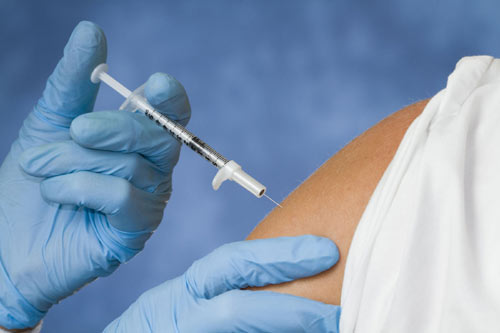
You were probably vaccinated years ago against a number of infectious diseases. The government requires it for entry to schools, many camps, colleges, and some occupations. Although most vaccinations are given in the first couple decades of life, even adults need an occasional shot in the arm, for several reasons. Some of us were never vaccinated as children.
Vaccines are available now that were not when today's adults were young. As you age, immunity can fade, leaving you susceptible to serious disease caused by common infections. And you may find yourself traveling to areas where certain infectious diseases are much more common than they are where you live.
The Advisory Committee on Immunization Practices of the U.S. Centers for Disease Control and Prevention has added several new vaccines to the list of those recommended for adults. Not everyone needs all of these vaccines. For example, the vaccine against sexually transmitted strains of the human papillomavirus (HPV) that cause cervical cancer is recommended only for girls and young women ages 9 through 26. That's because it works best if given before a young woman becomes sexually active and is exposed to HPV. On the other hand, the zoster (shingles) vaccine is recommended for everyone over age 60 to prevent shingles and reduce its excruciating pain (post-herpetic neuralgia).
Vaccination protects not only you as an individual but also the entire community, through a phenomenon called herd immunity. When you become infected, your vaccine-primed immune system limits the time you remain contagious, which minimizes the risk that you'll infect others. If everyone around you has been vaccinated, you're less likely to get infected. And if enough members of a community have vaccine protection, everyone in that community -- even the unvaccinated -- is less likely to get sick.
So stay up to date with your vaccinations. And be sure to check in with your clinician well before traveling outside the country for any additional shots you may need (for more information, visit the CDC's Traveler's Health Web site: www.cdc.gov/travel).
COMMONLY RECOMMENDED VACCINES FOR ADULTS AGE 50 AND OVER:
• Vaccine/dose: Influenza, 1 dose annually in the fall or winter Who should get it?: Anyone who wants to reduce the risk of becoming ill with the flu or transmitting it to others. NOTE: Should not be given to anyone who's had an anaphylactic reaction to eggs or the vaccine itself, or to anyone who contracted Guillain-Barré syndrome within 6 weeks after a previous influenza vaccination.
• Vaccine/dose: Pneumococcal, 1 or 2 doses Who should get it?: Anyone age 65 or older; anyone with a chronic illness, a weakened immune system, or a removed or damaged spleen; nursing home residents; anyone at high risk for pneumococcal disease. Should not be given to anyone who's had an anaphylactic reaction to this vaccine.
• Vaccine/dose: Tetanus, diphtheria, pertussis (Td/Tdap), 3 doses spaced at 0, 1-2 months, and 6-12 months; boosters every 10 years. Who should get it?: Adults under age 65 who haven't been vaccinated should receive an initial 3-dose series with 2 doses of Td and 1 of Tdap, then regular Td boosters every 10 years thereafter. Previously vaccinated adults should have boosters every 10 years, including a one-time Tdap booster as early as two years after the last Td booster, to boost pertussis immunity. This is especially important for people who are in close contact with infants. Should not be given to anyone who's had an anaphylactic reaction to this vaccine.
• Vaccine/dose: Measles, mumps, rubella (MMR), 1 dose Who should get it?: Anyone born after 1956 who hasn't been vaccinated. Should not be given to pregnant women, to anyone with a weakened immune system, or to anyone who's had an anaphylactic reaction to this vaccine.
• Vaccine/dose: Zoster (shingles), 1 dose Who should get it?: Adults ages 60 and older. Should not be given to pregnant women, to anyone with a weakened immune system, or to anyone who's had an anaphylactic reaction to this vaccine.
• Vaccine/dose: Varicella (chickenpox), 2 doses, 4 to 8 weeks apart Who should get it?: Health care workers born before 1980 who haven't had chicken pox or been vaccinated against it. Should not be given to pregnant women, to anyone with a weakened immune system, or to anyone who's had an anaphylactic reaction to this vaccine.
• Vaccine/dose: Hepatitis A, 2 doses, 6 months apart Who should get it?: Anyone who wants to be immune to hepatitis A infection; anyone with chronic liver disease or a clotting factor disorder; people whose work or lifestyle exposes them to hepatitis A virus; certain international travelers and food handlers. Should not be given to anyone who's had an anaphylactic reaction to this vaccine.
• Vaccine/dose: Hepatitis B, 3 doses, with 4 weeks between doses 1 and 2 and 8 weeks between doses 2 and 3. Who should get it?: Anyone wishing to become immune to hepatitis B infection; anyone with chronic liver disease, HIV infection, end-stage renal disease; people whose work or lifestyle exposes them to hepatitis B. Should not be given to anyone who's had an anaphylactic reaction to this vaccine.
• Vaccine/dose: Meningococcal, 1 dose Who should get it?: International travelers to countries where meningitis is widespread; laboratory workers exposed to meningococcal bacteria; anyone with terminal complement component deficiency. Should not be given to anyone who's had an anaphylactic or neurological reaction to this vaccine or any of its components, including diphtheria toxoid. Source: Adapted from the "General Recommendations on Immunization" of the Immunization Practices Advisory Committee, U.S. Centers for Disease Control and Prevention


 Contact The Editor
Contact The Editor
 Articles By This Author
Articles By This Author
